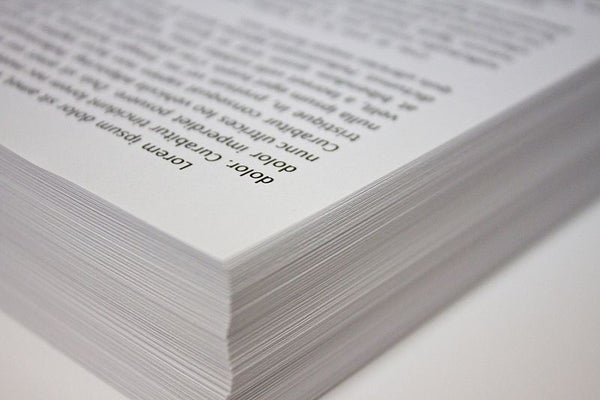This article was published in Scientific American’s former blog network and reflects the views of the author, not necessarily those of Scientific American
If you listen to global warming deniers, or even much of the public, it seems like there is some stack of scientific studies somewhere that refute anthropogenic–human-caused–climate change. If someone would just let them reach into that pile and pull out a paper, we’d all see that climate change is “a hoax,” or so it seems in our fractured discourse.
But with a new report out last week showing that 97% of published papers affirm a human cause for the changing climate–piggybacking on a report showing only 24 papers out of 14,000 refute climate change as a phenomenon–you might have to spend awhile page turning; you are more likely to have a stroke than pull a negative study from the pile.
Let’s put the number of scientific studies refuting climate change into perspective with a thought experiment. Imagine shuffling all the 14,000 papers published on climate change into a large pile. These are all the things more likely to happen than randomly picking one paper out of the pile that refutes climate change. It’s more likely that:
On supporting science journalism
If you're enjoying this article, consider supporting our award-winning journalism by subscribing. By purchasing a subscription you are helping to ensure the future of impactful stories about the discoveries and ideas shaping our world today.
You die in a car crash*
You’re accidentally killed at work
You have a stroke
You survive a plane crash (surprisingly likely)
You die of an unfortunate fall
A marriage on The Bachelor lasts longer than a year
You die of cancer
Well, that took a morbid turn**. But I think it’s useful to see the comparison. Judging by the highly vocal opposition to climate science, it certainly doesn’t seem like getting in a car accident is more likely than randomly choosing a dissenting paper from scientists.
When talking about chances, this is why it is so important to know what the background rate–how often an event occurs naturally over some time period–is. Some are deathly afraid of flight, even though it is the safest way to travel. Most of us don’t think twice before getting behind the wheel, even though it’s probably the most dangerous thing we do. Likewise, some vocal opponents of climate change will point to a handful of studies or scientists that disagree with the consensus, even though they represent a slice of the pie so small that you wouldn’t bother eating it.
But we can take the thought experiment further. Imagine that we get a hold of each scientific study of climate change used in the Powell report and throw it in a mailbag. It contains 13,950 papers, 24 of which refute climate change. I’ll let a climate change denier choose 10 papers out of the bag, removing each selection from the bag once it is picked. This is called sampling without replacement, meaning that no one will pick the same study twice. What are the chances that these ten studies will refute global warming?
0.000000000000000000000000003%
You are more likely to be hit by lightning, and then an asteroid.
By comparison, what is the chance that all those 10 studies will be in support?
97%
Of course, these numbers will be chalked up to a great government conspiracy to suppress dissenting opinions. But not only is a grand conspiracy against the odds, it’s against Occam.
This is what consensus looks like. It could be the case that all the studies supporting a warming planet are wrong, science always leaves that door open, but anthropogenic climate change remains the best explanation for a mountain of data that scientists have been pouring over for a century.
In the face of such overwhelming odds, a thousand points of insight, the only reason to doubt climate change, either as a phenomenon or human-caused, seems to be a political one. It’s a sad state of affairs when unjustifiable legislation is written and friendships are broken over a question that has an answer sitting inside a textbook.
Galileos still exist in science. Sometimes a lone proponent of a new idea turns out to be right. But people who want to use the astronomer’s example forget that he had the evidence on his side. In scientific publishing, when you have a lone Galileo standing up to a thousand others who have evidence that better explains what he sees, the singular genius argument falls apart. Among those who accept a scientific standard, the chances we are wrong about climate change are now next to nothing.
—
*Based on data here, here, and from the CDC, I calculated the percentages based on how many people died in 2010 and what they died from. For example, if you were one of the unfortunate to pass on in 2010, this would be the chance of dying from a certain cause (assuming that these rates are stable over the years). All were less than 1in 500, roughly equivalent to the 24/13,950 paper number.
**It’s a morbid comparison that I am making, but that is only because data on how we die is the easiest to come by. How likely it is for you to get a promotion, for example, would be impossible to calculate.
Image Credit:
Stack of paper by Jonathan Joseph Bondhus
